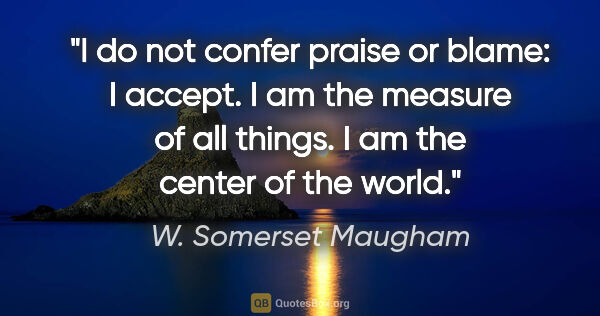Centered Quotes (page 11)
I should be at peace. I have understood. Don't some say that peace comes when you understand? I have understood. I should be at peace. Who said that peace derives from the contemplation of order, order understood, enjoyed, realized without residuum, in joy and truimph, the end of effort? All is clear, limpid; the eye rests on the whole and on the parts and sees how the parts have conspired to make the whole; it perceives the center where the lymph flows, the breath, the root of the whys....
Umberto Eco
The limits of variation are really much wider than any one would imagine from the sameness of women's coiffure and the favourite love-stories in prose and verse. Here and there a cygnet is reared uneasily among the ducklings in the brown pond, and never finds the living stream in fellowship with its own oary-footed kind. Here and there is born a Saint Theresa, foundress of nothing, whose loving heart-beats and sobs after an unattained goodness tremble off and are dispersed among hindrances,...
George Eliot

Everybody has some one thing they do not want to lose," began the man. "You included. And we are professionals at finding out that very thing. Humans by necessity must have a midway point between their desires and their pride. Just as all objects must have a center of gravity. This is something we can pinpoint. Only when it is gone do people realize it even existed.
Haruki Murakami
It seems to me if you add music (and books, probably, and films, and plays, and anything that makes you feel) at the center of your being, then you can't afford to sort out your love life, start to think of it as the finished product. You've got to pick at it, keep it alive and in turmoil, you've got to pick at it and unravel it until it all comes apart and you're compelled to start all over again. Maybe we live life at too high a pitch, those of us who absorb emotional things all day, and as...
Nick Hornby
The rite, the becoming-animal of the scapegoat clearly illustrates this: a first expiatory animal is sacrificed, but a second is driven away, sent out into the desert wilderness. In the signifying regime, the scapegoat represents a new form of increasing entropy in the system of signs: it is charged with everything that was "bad" in a given period, that is, everything that resisted signifying signs, everything that eluded the referral from sign to sign through the different circles; it also...
Gilles Deleuze


